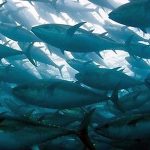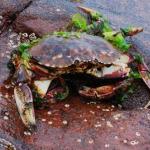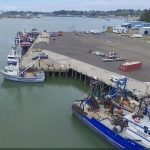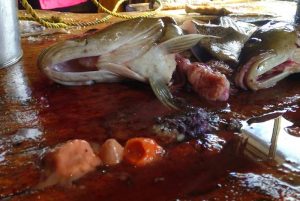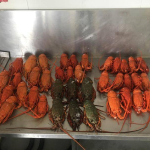Tag Archives: new-england-fishery-management-council
Push for aid for fishery intensifies as budget process begins
![]() WASHINGTON — Less than three months after an effort to provide a pool of aid to distressed fisheries across the nation died at the end of the last Congress, efforts to secure disaster relief funding for New England fishermen are heating up on Capitol Hill. continue reading
WASHINGTON — Less than three months after an effort to provide a pool of aid to distressed fisheries across the nation died at the end of the last Congress, efforts to secure disaster relief funding for New England fishermen are heating up on Capitol Hill. continue reading
Opportunity to Comment on Proposed Management Measures for Groundfish Fishery for 2013: DEADLINE FOR COMMENTS IS APRIL 15, 2013
Editorial: Influx of cod must spark feds to delay limit cuts
![]() But the influx of cod must be seen as bad news by those esteemed NOAA “scientists” and officials who, with the help of their closely-related environmental nonprofit spin doctors, have poured countless PR dollars and effort into spreading the false word that, indeed, the cod stocks are so diminished — especially from the Gulf of Maine — that we need to cut those fishermen’s 2013 quota by a job- and industry-killing 77 percent. continue reading
But the influx of cod must be seen as bad news by those esteemed NOAA “scientists” and officials who, with the help of their closely-related environmental nonprofit spin doctors, have poured countless PR dollars and effort into spreading the false word that, indeed, the cod stocks are so diminished — especially from the Gulf of Maine — that we need to cut those fishermen’s 2013 quota by a job- and industry-killing 77 percent. continue reading
Auctions confirm renewed ‘uptick’ in cod – following its age-old pattern
![]() Both of Gloucester’s general fish auction houses are confirming reports by fishermen that cod — the fish that helped make this city the world’s oldest, most famous and, for a long time, its busiest fishing port — appears to be following its age-old pattern as it swims in increasing numbers into the shallow waters off Cape Ann. continue reading
Both of Gloucester’s general fish auction houses are confirming reports by fishermen that cod — the fish that helped make this city the world’s oldest, most famous and, for a long time, its busiest fishing port — appears to be following its age-old pattern as it swims in increasing numbers into the shallow waters off Cape Ann. continue reading
Pew Environment Group Targets John Bullard in Online Petition Drive Against NEFMC Proposed Changes to Closed Areas
 March 18, 2013 — Calling current efforts being undertaken by the New England Fishery Management Council “a short-sighted plan” that ” threatens New England’s coastal ecosystem,” the Pew Environment Group’s Peter Baker has issued an email call to action asking recipients to “tell NOAA officials that New England’s iconic fish need protection now more than ever.” continue
March 18, 2013 — Calling current efforts being undertaken by the New England Fishery Management Council “a short-sighted plan” that ” threatens New England’s coastal ecosystem,” the Pew Environment Group’s Peter Baker has issued an email call to action asking recipients to “tell NOAA officials that New England’s iconic fish need protection now more than ever.” continue
A Historian’s Perspective on Cod Fishing’s Drastic Downturn – : Christine Buckley
![]() Matthew McKenzie calls Dec. 20, 2012 the unqualified worst day of his professional life. Ironically, it was made so horrible because two groups of people who rarely if ever agree – fishermen from Maine, Massachusetts, and Connecticut and biologists who study these New England waters – were in total agreement. continue
Matthew McKenzie calls Dec. 20, 2012 the unqualified worst day of his professional life. Ironically, it was made so horrible because two groups of people who rarely if ever agree – fishermen from Maine, Massachusetts, and Connecticut and biologists who study these New England waters – were in total agreement. continue
ANALYSIS: NY Times Blog Post Misleads Readers on New England Habitat Closed Area Changes
 WASHINGTON (Saving Seafood) 13 March 2012 — The New York Times, in a recent blog post, fails to accurately describe the original rationale of the New England / Georges Bank closed areas, and does little to explain the credible science backing the New England Fishery Management Council’s decision-making. Many of the closed areas in question don’t actually protect marine habitats, because they were never designed to do so. Instead, they’re the vestiges of a phased-out system of management that limited fishing effort, and are redundant under current regulations. continue
WASHINGTON (Saving Seafood) 13 March 2012 — The New York Times, in a recent blog post, fails to accurately describe the original rationale of the New England / Georges Bank closed areas, and does little to explain the credible science backing the New England Fishery Management Council’s decision-making. Many of the closed areas in question don’t actually protect marine habitats, because they were never designed to do so. Instead, they’re the vestiges of a phased-out system of management that limited fishing effort, and are redundant under current regulations. continue
Portsmouth’s Tom Nies to lead the New England Fishery Management Council
 The 18 members of the New England Fishery Management Council recently selected Tom Nies of Portsmouth as the agency’s new executive director. He succeeds Capt. Paul Howard, who served in the role for 16 years. Howard’s last day was Friday, and Nies steps into the post on Monday. Read more
The 18 members of the New England Fishery Management Council recently selected Tom Nies of Portsmouth as the agency’s new executive director. He succeeds Capt. Paul Howard, who served in the role for 16 years. Howard’s last day was Friday, and Nies steps into the post on Monday. Read more
“The big boats are taking over and they’re killing the little guys off,” Small fishermen’s plight discussed at forum in city
PORTSMOUTH — Participants in the Who Fishes Matters Tour fisheries forum Monday night discussed ways to improve the beleaguered catch share system of fisheries management. Read more![]()
‘Phantom’ fishing discards seen skewing fish quotas – absurdities which helps explain the poor quality of NOAA fisheries science
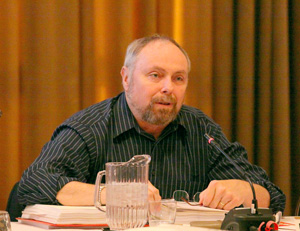 Calculating discards, an essential component in the fishery management system, has evolved into a knot of absurdities which helps explain the poor quality of NOAA fisheries science, says David Goethel, a commercial fisherman and member of the New England Fishery Management Council. Read more
Calculating discards, an essential component in the fishery management system, has evolved into a knot of absurdities which helps explain the poor quality of NOAA fisheries science, says David Goethel, a commercial fisherman and member of the New England Fishery Management Council. Read more
John Bullard – No guarantees that fish stocks will come back
The big question is: Why has this happened? Over the years, quotas have been gradually reduced, but still the fish aren’t coming back as expected. It isn’t simply a case of overfishing. There are environmental forces at play such as![]() predation from recovered populations of dogfish and seals, changes in ocean water temperature and increases in ocean acidity. So, while it may not be totally on the fishermen’s shoulders, it will be the fishermen who will have to pay the price. Read more
predation from recovered populations of dogfish and seals, changes in ocean water temperature and increases in ocean acidity. So, while it may not be totally on the fishermen’s shoulders, it will be the fishermen who will have to pay the price. Read more
New England groundfishermen are taking the gloves off in the fight for survival
 175 Fishermen to Congress: Failed Government Policies Caused the Fishing Crisis, We’ve Done Nothing Wrong
175 Fishermen to Congress: Failed Government Policies Caused the Fishing Crisis, We’ve Done Nothing Wrong
– “The forced transition of our New England groundfish fishery to catch share management and hard TACs came with all sorts of rosy promises of resource abundance and economic stability,” they write. They also noted that many businesses were unable to survive the transition.
– Rather than producing the promised benefits, the transfer of the groundfishery to sector management has led to a prolonged period of economic instability. “There is no stability. There are only repeated, record reductions in catch limits. Prosperity is a discarded dream.”
– They blame the current state of the groundfishery on failed government management, writing: “Three weeks ago, NMFS Regional Administrator John Bullard told us at the Council meeting that this was our day of reckoning. This is not our day of reckoning – we’ve done nothing wrong to reckon. We didn’t cause this problem.” Instead, they maintain that the government does not have the science and data necessary to properly manage the fishery. “For too long we’ve been subjected to the volatility and futility of pretending to know the unknowable.”
“For nearly a decade now our fishery has fished at or below every catch limit set by the government on every stock. We lived within their quotas, but it is now our businesses, our families and our communities that will be paying the price.”
“Government cannot expect our industry to continue to be subjected to drastic cuts in allowable catches while placing additional, government-imposed expenses upon us.”
– They noted that, as the current catch share management system was being implemented, the Northeast Seafood Coalition publicly made clear that adequate federal funding and catch allocations would be needed for the system to properly function. They added: “Sure enough, here we are – less than 3 years after sector implementation – and the agency is telling us there is not enough money to monitor or enough fish to sustain our fishery. It’s difficult for many of us to believe that this was just a coincidence.” Read more and read the original letters with the signing fishermen
Editorial: Time to pull plug on NOAA’s joke of observer program
Speaking last week at a meeting of the New England Fishery Management Council, current NOAA regional administrator John Bullard announced that, because NOAA somehow didn’t include full funding for the observer program, New  England’s fishermen will have to pick up the cost themselves. That sounded ridiculous last week. But the now-documented and continued unfit status of these observers — and frankly, those who hire them — have now carried Bullard’s and NOAA’s demand to the level of the absurd. Read more here
England’s fishermen will have to pick up the cost themselves. That sounded ridiculous last week. But the now-documented and continued unfit status of these observers — and frankly, those who hire them — have now carried Bullard’s and NOAA’s demand to the level of the absurd. Read more here
Peter Shelley to NEFMC: Shut Down New England Cod Fishery
 Last Wednesday, January 30, the New England Fishery Management Council voted to cut catch limits for New England’s cod stocks by 66-71% from their 2012 levels. Conservation Law Foundation Senior Counsel Peter Shelley made this unplanned statement to the Council urging cautious management and asking them to consider shutting down the New England cod fishery so stocks can recover. Listen to audio of the entire meeting here. Read more here
Last Wednesday, January 30, the New England Fishery Management Council voted to cut catch limits for New England’s cod stocks by 66-71% from their 2012 levels. Conservation Law Foundation Senior Counsel Peter Shelley made this unplanned statement to the Council urging cautious management and asking them to consider shutting down the New England cod fishery so stocks can recover. Listen to audio of the entire meeting here. Read more here
On the brink: New fishing restrictions — Frustration, anger and perhaps end of an industry –
![]() John Bullard, regional administrator of the National Marine Fisheries Service and the National Oceanic and Atmospheric Administration, said an interim measure is only an allusion.“Fisherman don’t need allusions,” Bullard said. “They need a big dose of reality.” The interim action kept the fishery in business while addressing fish stock assessment numbers that were much lower than initially reported. Goethel said that discrepancy in stock assessment needs examination.“There should have been a real serious examination from outside the organization, not just from within,” he said. “We have to start looking for other underlying causes to this problem.” Read more here
John Bullard, regional administrator of the National Marine Fisheries Service and the National Oceanic and Atmospheric Administration, said an interim measure is only an allusion.“Fisherman don’t need allusions,” Bullard said. “They need a big dose of reality.” The interim action kept the fishery in business while addressing fish stock assessment numbers that were much lower than initially reported. Goethel said that discrepancy in stock assessment needs examination.“There should have been a real serious examination from outside the organization, not just from within,” he said. “We have to start looking for other underlying causes to this problem.” Read more here
ANALYSIS: Why are fishermen angry about the new cod quotas if they can’t catch cod anyway?
 In the wake of Wednesday’s vote by the New England Fishery Management Council to slash cod catch rates by 77% in the Gulf of Maine and by 55% in Georges Bank,the question arose: “Why, if the fishermen can’t find fish anyway, do they care if the quota is cut?” Saving Seafood interviewed fishermen, industry members, and scientists to pose that question, and compiled their answers. The result follows: Read more
In the wake of Wednesday’s vote by the New England Fishery Management Council to slash cod catch rates by 77% in the Gulf of Maine and by 55% in Georges Bank,the question arose: “Why, if the fishermen can’t find fish anyway, do they care if the quota is cut?” Saving Seafood interviewed fishermen, industry members, and scientists to pose that question, and compiled their answers. The result follows: Read more
Fishermen saw cuts coming
 When previous catch reductions have been rolled out by the New England Fishery Management Council, fishermen have reacted with some degree of anger. This time, though, the council’s announcement of a stiff drop in the allowable catch of cod and other groundfish has been met by many on the Cape with something else: resignation. Fisherman Greg Walinski of Dennisport was one who saw this coming, but he said there’s more to the problem than just overfishing. Read more
When previous catch reductions have been rolled out by the New England Fishery Management Council, fishermen have reacted with some degree of anger. This time, though, the council’s announcement of a stiff drop in the allowable catch of cod and other groundfish has been met by many on the Cape with something else: resignation. Fisherman Greg Walinski of Dennisport was one who saw this coming, but he said there’s more to the problem than just overfishing. Read more
Drastic groundfishing cuts approved by fishery management agency
UPDATE… 6:27 PM Wed. New England Fisheries Management Council recommends cutting Cod fishing limits in the Gulf of Maine by 77% and in George’s Bank by 55%. This is critical, fisherman say, because catching cod leads to catching other fish like haddock. They say the cuts are devastating. Watch video
Officials Back Deep Cuts in Atlantic Cod Harvest to Save Industry –
New York Times “I do not deny the costs that are going to be paid by fishermen, families, communities. They are real. They will hurt.” The problem, he said, is not government inflexibility, as fishermen have suggested, but the lack of fish. “It’s midnig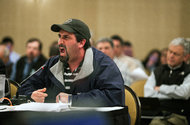 ht and getting darker when it comes to how many cod there are,” he said. “There isn’t enough cod for people to make a decent living.” But opponents said the limits would not help save the industry.
ht and getting darker when it comes to how many cod there are,” he said. “There isn’t enough cod for people to make a decent living.” But opponents said the limits would not help save the industry.
“Right now what we’ve got is a plan that guarantees the fishermen’s extinction and does nothing to ameliorate it,” David Goethel, a New Hampshire-based fisherman and biologist, said as he cast his vote against the plan.
Fishermen were furious with the result.“I’m leaving here in a coffin,” said Carlos Rafael, who owns a commercial fishing business in New Bedford, Mass. “With all these cuts, I won’t be able to keep half of my fleet working. I’ll have to cut down from 20 groundfish boats to maybe 5or 6.” Read more
Keep the Fishing Ban in New England – CALLUM ROBERTS, YORK, England
![]() Where were the regulators through all of this? Always one step behind and perennially ineffective. Federal law delegated to the New England Fishery Management Council authority to manage the fishery from 3 miles to 200 miles off the coast, but the council didn’t see its job as speaking up for fish. This body was dominated by fishing interests, so when faced with a choice of fishing now or cutting back the catch to assure the fishery’s future, the council’s decisions often favored the short term. With such decisions, collapse of the fishery was inevitable. When it happened in the late 1980s, it was brutal and swift. By the early 1990s, all agreed that something had to be done. The council reinvented its approach to fishery management.Read more
Where were the regulators through all of this? Always one step behind and perennially ineffective. Federal law delegated to the New England Fishery Management Council authority to manage the fishery from 3 miles to 200 miles off the coast, but the council didn’t see its job as speaking up for fish. This body was dominated by fishing interests, so when faced with a choice of fishing now or cutting back the catch to assure the fishery’s future, the council’s decisions often favored the short term. With such decisions, collapse of the fishery was inevitable. When it happened in the late 1980s, it was brutal and swift. By the early 1990s, all agreed that something had to be done. The council reinvented its approach to fishery management.Read more
New England panel approves 2013 cod limits with 77 percent cut
The New England Fishery Management Council voted Wednesday night to cut the Gulf of Maine cod fishery limits by 77 percent for the 2013 fishing cycle and to extend similar cuts for the 2014 and 2015, dealing a dire blow to the region’s fishing industry. Why this should be so became a sub-theme of the day, with the phrase “regime shift” used frequently to suggest a braid of environmental and ecological alterations —including millions of lobster traps that take an unknown quantity of cod as by-catch, large volumes of herring which eat cod eggs and seals which feed on cod, as well as the various forms of global warming that emanate from and absorb into the seas. Read more
Crippling ‘reality’ arrives for New England fishermen
The few fishermen who still ply New England’s waters for cod, haddock and other groundfish are bracing for a double dose of bad news this week…..as expected, slash already reduced catch limits by another 70 percent to 80 percent to protect fish populations that scientists now say are much smaller than previously thought….”If the collective goal is to rebuild stocks … then if we don’t start looking at the causes of the problem, we are not going to find a solution.”…..”I don’t know why we should believe the science when three years ago they said the stocks were rebuilding,” Read more
A Must Read – Common-sense fisheries oversight needed By Daniel Goethel. “Extinction”
As the debate looms over whether Gulf of Maine cod catch limits for 2013 and beyond should be cut by 90 percent or a mere 80 percent, I found myself drawn to a piece of writing that I submitted as part of my college applicatio n in 2002. Dramatically enough, it was titled “Extinction” and recapped my naive first 18 years of life as part of a small-boat New England fishing family. The essay started ominously enough by stating that “every year, New England’s fleet shrinks and approaches extinction.” Typically enough, for a pro-fisherman piece, it bashed government science for using incorrect data and ignoring fishermen’s observations, while bemoaning the days of 30-pound trip limits. However, it ended on a cautiously optimistic note highlighting the then-recent increase in cod trip limits to 400 pounds a day.
n in 2002. Dramatically enough, it was titled “Extinction” and recapped my naive first 18 years of life as part of a small-boat New England fishing family. The essay started ominously enough by stating that “every year, New England’s fleet shrinks and approaches extinction.” Typically enough, for a pro-fisherman piece, it bashed government science for using incorrect data and ignoring fishermen’s observations, while bemoaning the days of 30-pound trip limits. However, it ended on a cautiously optimistic note highlighting the then-recent increase in cod trip limits to 400 pounds a day.
Looking back at this work, written more than a decade ago, I am dumbfounded to see that New England groundfish management has once again regressed. Today, I am deep into my pursuit of a PhD in fisheries stock assessment,,,,,,,,Read the rest
The Salem News Our view: NOAA leaders should extend cod rules
 It’s too early to gauge the legitimacy of the latest NOAA science and assessment of the Gulf of Maine cod stocks.,,,But given that the latest assessments may yield cuts in cod landing limits of up to 86 percent over the already diminished current year, NOAA and its New England Fishery Management Council owe it to all fishermen to do a thorough review of the methodology that’s gone into a study that could virtually wipe out the Northeast groundfishing industry for the new fishing year beginning May 1. Read more
It’s too early to gauge the legitimacy of the latest NOAA science and assessment of the Gulf of Maine cod stocks.,,,But given that the latest assessments may yield cuts in cod landing limits of up to 86 percent over the already diminished current year, NOAA and its New England Fishery Management Council owe it to all fishermen to do a thorough review of the methodology that’s gone into a study that could virtually wipe out the Northeast groundfishing industry for the new fishing year beginning May 1. Read more
Northeast fishing chief: Devastating cuts coming – said blame for the situation goes to managers, because “we set the rules and clearly the rules have failed.”
Regional regulators will meet Wednesday to decide catch limits for fishermen who chase bottom-dwelling groundfish, such as cod and haddock.
But committees of the New England Fishery Management Council have already recommended massive cuts fishermen say will cause industry collapse. Read more
GloucesterTimes.com Editorial: NOAA leaders should extend current cod rules
Indeed, it’s time that NOAA officials realize that, until there is true cooperative research and stock assessments involving both the government and the industry, there will be dire credibility questions about science from an agency that admittedly used the wrong-sized nets and other gear in the infamous “Trawlgate” scandal at the turn of the new century, and from an agency led by a “scientist” — outgoing NOAA administrator Jane Lubchenco — who was a major signer to the alarmist “Oceans of Abundance” report that was corporately funded by the Walton Foundation of Walmart fame, and has been widely refuted across the marine science community. Read more
admittedly used the wrong-sized nets and other gear in the infamous “Trawlgate” scandal at the turn of the new century, and from an agency led by a “scientist” — outgoing NOAA administrator Jane Lubchenco — who was a major signer to the alarmist “Oceans of Abundance” report that was corporately funded by the Walton Foundation of Walmart fame, and has been widely refuted across the marine science community. Read more
US scallop inventories expected to decline in 2013 on new management plan
Framework Adjustment 24 to the Sea Scallop Plan was approved at the November 2012 meeting of the New England Fishery Management Council. The action sets specifications that include adjusting the days-at-sea allocations, general category fishery allocations and the area rotation schedule for 2013. Video
Guest View: The end of “overfishing”? By Dr.Brian J. Rothschild (new england trusted)
Brian J. Rothschild is the Montgomery Charter professor of Marine Science and Technology at the UMass Dartmouth School for Marine Science and Technology.
The necessity of imposing the cuts is not clear. The council’s scientific committee has had difficulties reaching consensus on the management of key stocks. The Council is faced with a dilemma. If the stocks are down and the cuts are necessary, how do we mitigate the impact of the cuts on the people who work in the fishing industry and fishing communities, and then how do we plan for the future? At the same time, if the stocks are not down and the cuts are not necessary, how do we promote stability within the fishing industry and fishing communities, and then how do we plan for the future?
To understand the council’s short- and long-range plans on how to deal with its dilemma is crucial, particularly since the condition of the groundfish stocks may not be as bad as it seems. Read More






 SEAFOOD.COM NEWS by John Sackton (Editorial Comment) – June 15, 2011 A
SEAFOOD.COM NEWS by John Sackton (Editorial Comment) – June 15, 2011 A


























